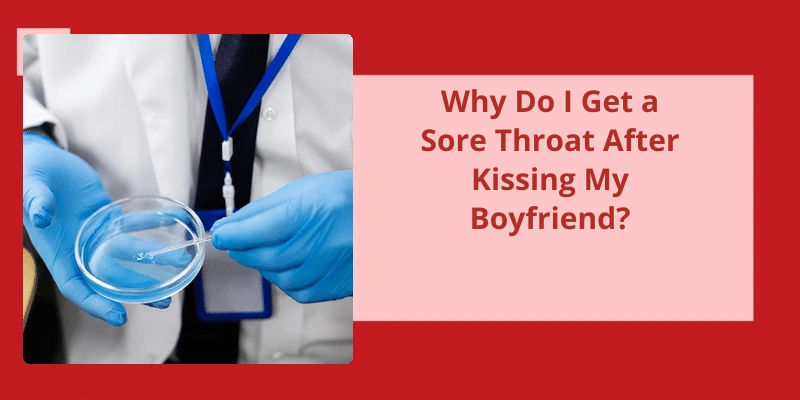For many people, a kiss is an expression of love and affection. However, for some, kissing can lead to an uncomfortable and painful experience. If you’ve ever experienced a sore throat after kissing your boyfriend, you may be wondering why this happens. The answer lies in a contagious disease known as mononucleosis, commonly referred to as "mono" or "the kissing disease." This illness, caused by the Epstein-Barr virus (EBV), spreads through saliva and can cause a range of symptoms that mimic those of the flu, including fatigue, muscle weakness, fever, and swollen lymph glands. In this article, we will explore the reasons why kissing can lead to a sore throat, and what you can do to prevent and treat this uncomfortable condition.
Can Giving BJ Cause Sore Throat?
When it comes to sex, there are many rumors and speculations surrounding it. One of the most common rumors is that giving a blowjob can cause a sore throat. While there are some instances where it can lead to discomfort, it isn’t a guarantee. There are several reasons why someone can develop a sore throat after performing oral sex.
First and foremost, it’s essential to understand that a sore throat is the result of an irritation or inflammation of the pharynx.
Additionally, the presence of bacteria and germs can also lead to infections. Therefore, you must practice good oral hygiene before and after oral sex. Brushing your teeth, using mouthwash, and flossing can help remove any bacteria or germs present in the mouth. It’s also advisable to use protection such as condoms during oral sex to prevent the spread of sexually transmitted infections (STIs).
Some people may use deep-throating, which can lead to injuries to the throat and irritation. It’s crucial to communicate with your partner and their requirements and limitations to avoid discomfort and injuries during oral sex.
Allergy to certain foods can also irritate the throat and lead to soreness. If you or your partner has a food allergy, it’s best to avoid it before and after oral sex.
Sexually transmitted diseases (STDs) can be contracted through various ways, and one of the most common methods is through oral sex. However, engaging in this type of sexual activity may also lead to various health risks, including developing a sore throat. In fact, there are several STDs linked to a sore throat, which can pose a serious threat to an individual’s overall health and wellbeing. What’re these STDs, and how can they be prevented and treated? Read on to find out more.
What STD Causes Sore Throat After Oral?
Syphilis is a bacterial infection that can be transmitted through oral sex, and one of it’s most common symptoms is a sore throat. The sore throat usually appears about three weeks after exposure to the bacteria and can be accompanied by other symptoms such as fever, rash, and swollen lymph nodes. If left untreated, syphilis can cause severe health problems such as brain damage and heart damage.
Gonorrhea is another bacterial infection that can be contracted through oral sex. Other symptoms of gonorrhea include painful urination and discharge from the genitals. Gonorrhea can also lead to serious health problems if left untreated, including infertility and joint pain.
Herpes is a viral infection that can be transmitted through oral sex. The virus can cause cold sores and genital herpes, but it can also cause a sore throat. Although there’s no cure for herpes, antiviral medications can help manage the symptoms.
Chlamydia is a bacterial infection that can be transmitted through oral sex, and it can also cause a sore throat. Other symptoms of chlamydia include painful urination and discharge from the genitals. If left untreated, chlamydia can lead to pelvic inflammatory disease and infertility.
Engaging in unprotected oral sex can lead to the transmission of sexually transmitted infections that can cause sore throat as one of their symptoms. Early diagnosis and treatment are critical in preventing the development of serious health problems caused by these infections. Practicing safe sex, using condoms, and avoiding multiple sexual partners can also help reduce the risk of contracting and spreading sexually transmitted infections.
Therefore, it’s crucial to take precautions and practice safe sex to avoid the transmission of STIs. In this article, we will delve deeper into the reasons behind mouth pain after a BJ and ways to prevent it.
Why Does My Mouth Hurt After a BJ?
Gonorrhea, syphilis, human papillomavirus (HPV), herpes, and HIV. These infections can cause mouth sores which can be painful and uncomfortable. Apart from that, there are other reasons why your mouth might hurt after performing oral sex. An oral infection such as thrush, which is a fungal infection caused by candida, can lead to discomfort in your mouth. This can be common in people with weakened immune systems, those who smoke, or those who take antibiotics.
Sexually active people develop oral calluses or mucosal abrasions from sex, including oral sex, and they aren’t considered sexually transmitted infections. These can cause pain and discomfort, especially if the friction is forceful. To prevent this, it’s important to use lubrication as it can reduce the risk of injury from friction.
If you were in an uncomfortable or awkward position that required you to keep your mouth open for a long period of time, it could lead to pain in your mouth or jaw muscles. You may notice pain in your temporomandibular joint (TMJ), which is the hinge joint that connects the jawbone to the skull. This pain can be alleviated by switching positions or taking breaks in between.
In some instances, performing oral sex can lead to an uncomfortable feeling in your mouth, especially if youre someone who doesn’t enjoy it. If this is the case, it’s important to communicate with your partner and discuss ways to make the experience more enjoyable and comfortable.
Mouth pain after a BJ can be caused by a variety of reasons including sexually transmitted infections, oral infections, friction, awkward positions, and anxiety. It’s important to communicate with your partner about your needs and to seek medical advice if you suspect an STI. Additionally, using lubrication and taking breaks in between can help alleviate discomfort caused by friction and awkward positions. Take care of your sexual health and prioritise your comfort during sexual experiences.
Therefore, it’s important to maintain good oral hygiene and limit your exposure to potential harmful pathogens by avoiding kissing someone with obvious signs of poor oral health. But, is bad breath really something you should be worried about? Let’s explore the potential health risks of kissing someone with bad oral hygiene.
Can You Get Sick From Kissing Someone With Bad Oral Hygiene?
When it comes to kissing, bad oral hygiene can definitely pose a significant health concern. Kissing can transmit many germs, including those that cause cold sores, glandular fever, and tooth decay.
Cold sores are caused by the herpes simplex virus, and they can be passed from one person to another through direct contact, such as kissing. Another infection that can commonly be transmitted through kissing is glandular fever. This viral infection is caused by the Epstein-Barr virus, and it can cause symptoms like fatigue, fever, and sore throat.
These infections can be very serious, and in some cases, they can even be life-threatening.
Source: Kissing and your health – Better Health Channel
It’s important to prioritize sexual health, even if it feels uncomfortable or embarrassing. Seeking medical attention is the best course of action to take if you’re experiencing soreness or pain after giving oral sex. In addition to speaking with a medical professional, it’s important to understand the potential risks involved with unprotected oral sex.
What Do You Do if Your Throat Hurts After Giving Oral?
Oral sex, whether it’s giving or receiving, can put you at risk for a variety of sexually transmitted infections (STIs). Some of the most common STDs spread through oral sex are chlamydia, gonorrhea, herpes, HPV, and syphilis. The symptoms of these infections can vary widely, but sore throat is often a sign of something more serious. Thats why it’s important to get checked out as soon as possible if your throat starts hurting after giving oral.
When you visit a doctor or nurse, they’ll likely take a swab of your throat to test for any infections. They may also suggest other tests, like blood tests or urine tests, depending on what they suspect could be causing your symptoms. If you do test positive for an STD, your healthcare provider will work with you to develop a treatment plan that addresses your specific needs.
In addition to getting tested and treated for STDs, there are other steps you can take to help soothe your sore throat. Drinking plenty of fluids, especially warm fluids like tea or soup, can help to relieve the pain and inflammation in your throat. You can also try sucking on lozenges, gargling with salt water, or using a humidifier to add moisture to the air.
It’s important to remember that having an STD doesn’t make you a bad person, and anyone can contract one of these infections. The best thing you can do is take care of yourself, both physically and emotionally, and seek help when you need it. If you feel embarrassed or ashamed about your situation, remember that healthcare providers are trained to treat all patients respectfully and confidentially.
Not only can they help to relieve your symptoms, but they can also test you for any STDs that may be causing your discomfort. Remember that taking care of your sexual health is an important part of overall wellness, and theres no shame in seeking help when you need it.
Conclusion
In conclusion, it’s evident that kissing can lead to the transmission of the Epstein-Barr virus (EBV) which can cause mononucleosis or the "kissing disease." This virus is spread through saliva and can cause symptoms similar to those of the flu such as fever, sore throat, fatigue, muscle weakness, and swollen lymph glands. Therefore, it’s vital to practice good hygiene and avoid close contact with individuals who’ve symptoms of the virus to prevent it’s spread. It’s also beneficial to seek medical attention if symptoms persist or worsen to receive proper treatment and care. Overall, being mindful of one's health and taking necessary precautions can help to prevent the spread of infectious diseases like EBV and promote better overall well-being.






